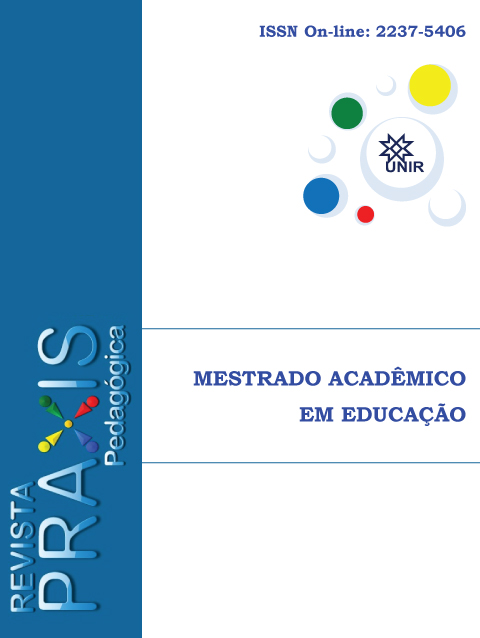HOMEM VERSUS EDUCAÇÃO
OS DESFECHOS DO PERÍODO MILITAR NA EDUCAÇÃO BRASILEIRA (1964-1985)
DOI:
https://doi.org/10.69568/2237-5406.2018v1n4e3856Palavras-chave:
Educação, Regime militar, EscolaResumo
Este artigo é fruto da disciplina de Educação Brasileira do Programa de Mestrado acadêmico da Universidade Federal do Acre campus de Rio Branco, e trata-se de um recorte bibliográfico, utilizamos uma linguagem de fácil compreensão ao leitor, temos o intuito de fazermos uma reflexão do aglomerado histórico da educação brasileira, das lutas, direitos e conquistas, fazendo relação homem versus educação tendo como base a bibliografia trabalhada na disciplina, traçando aspectos políticos, sociais e culturais, fazendo relação ainda com a educação na contemporaneidade. Utilizaremos para tanto importantes nomes na educação, CURY (1985), LIBÂNEO (2002), KANT (2002), SAVIANI (1997- 2005), entre outros citados e debatidos em sala de aula, a fim de contribuir com a formação dos mestrandos. Neste trabalho depois de refletirmos a relação do homem com a educação no decorrer da história, iremos focar no período em que a Educação foi gerida pelo governo no regime militar, no período de 1964 a 1985, trazendo um breve esboço sobre fatos e acontecimentos que mudaram o sistema educacional e o ensino no Brasil, por esse período ser rico em características e mudanças políticas-sociais, com o intuito de compreender ainda mais a relação de interesses e contextos históricos da sociedade.
Referências
BASBAUM, L. História Sincera da República (de 1961 a 1967). 1 ed. São Paulo: Fulgor, 1968
CURY, C. J. Ideologia e educação brasileira: católicos e liberais. 4. ed. São Paulo: Autores Associados, 1985
EYNG, Ana Maria; PACIEVITCH, Thais. Das políticas de acesso e permanência na escola ao direito à educação básica de qualidade social: avanço possível? Trabalho apresentado no EDUCERE: XII Congresso Nacional de Educação. PUC-PR. Paraná, 2015. Disponível em: http://educere.bruc.com.br/arquivo/pdf2015/20481_10675.pdf Acesso em 25 jan. 2017
______. A educação básica no Brasil educ. Soc., Campinas, vol. 23, n. 80, setembro/2002, p. 168-200 Disponível em http://www.cedes.unicamp.br> Acesso em 23 fev. 2017
FÁVERO, O. A educação nas constituintes brasileiras. Campinas: Autores Associados, 2005.
FRIGOTTO, G. A produtividade da escola improdutiva: um (re)exame das relações entre educação e estrutura econômico-social capitalista. São Paulo: Cortez, 2006.
GERMANO, José W. Estado militar e educação no Brasil, 1964-1985. Campinas, SP: Cortez, 1993.
GUIRALDELLI JR. P. Filosofia e História da Educação Brasileira. Barueri, SP: Manoli, 2003.
KANT, Immanuel. Sobre Pedagogia. Trad. Francisco C. Fontanella. 3a Edição. Piracicaba, SP: Editora UNIMEP, 2002.
LIBÂNEO, José Carlos. O dualismo perverso da escola pública brasileira: escola do conhecimento para os ricos, escola do acolhimento social para os pobres. Educação e pesquisa, São Paulo, v..38, n1, p13-28, 2012.
LIMA, Elizabeth Miranda de. Consenso, dissenso e trama: a LDB e o novo ordenamento da educação nacional. Rio Branco: EDUFAC, 2004. 175p. (Serie Dissertações e Teses 4).
OLIVEIRA, Rodrigo Mendes. O projeto educacional brasileiro durante o regime militar e o ensino de história em goiás (1964-1979). Dissertação apresentada no PROGRAMA DE PÓS-GRADUAÇÃO EM HISTÓRIA– PPGH-
UFG. Goiânia-GO 2015. Disponível em: https://repositorio.bc.ufg.br/tede/bitstream/tede/5323/5/Disserta%C3%A7%C3% A3o%20-%20Rodrigo%20Mendes%20Oliveira%20-%202015.pdf. Acesso em 17 fev. 2017.
SAVIANI Dermeval. A Nova lei da educação: Trajetória, limites e perspectivas. Campinas, SP: Autores Associados, 1997.
______. Pedagogia histórico-crítica: primeiras aproximações. 9a Edição. Campinas, SP: Autores Associados, 2005.
SBARDELOTTO, Denise Kloeckner. Educação no regime civil-militar (1964- 1985) no brasil e a teoria do capital humano. Trabalho apresentado na XI Jornada HISTEDBR, Cascavel-PR, 2013. Disponível em: http://www.histedbr.fe.unicamp.br/acer_histedbr/jornada/jornada11/artigos/4/arti go_simposio_4_554_deniseklsb@yahoo.com.br.pdf. Acesso em 12 mar. 2017
Downloads
Publicado
Edição
Seção
Licença
Ao submeter um artigo à Revista Praxis Pedagógica e tê-lo aprovado, os autores concordam em ceder, sem remuneração, todos os direitos de primeira publicação e a permissão para que Praxis Pedagógica redistribua esse artigo e seus metadados aos serviços de indexação e referência que seus editores julguem apropriados.


